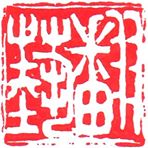Interview: Eric Abrahamsen and Paper Republic
 Today is a particularly good day for Chinese literature in translation, with the launch of Read Paper Republic, a new initiative from the wonderful Paper Republic, a website and publishing consultancy based around a collective of China-based translators. Well-known in Chinese literary circles, Paper Republic aims to connect Chinese and foreign publishers, and throw a spotlight on events in the Chinese literary scene.
Today is a particularly good day for Chinese literature in translation, with the launch of Read Paper Republic, a new initiative from the wonderful Paper Republic, a website and publishing consultancy based around a collective of China-based translators. Well-known in Chinese literary circles, Paper Republic aims to connect Chinese and foreign publishers, and throw a spotlight on events in the Chinese literary scene.
Between Thursday 18th June 2015 and 16th June 2016, on the Paper Republic site there will be a complete, free-to-view short story (or essay or poem) by a contemporary Chinese writer every week for the whole year. We can't wait! In fact, we're supporting the Read Paper Republic UK launch with a special event on July 4th, as part of our Writing Chinese symposium, and in association with the Free Word Centre and the Leeds Writers Circle. See our events page for more on this.
In the meantime, we're delighted to be joined by Eric Abrahamsen, literary translator and founder of Paper Republic, to tell us a bit more about his work. Eric has lived in Beijing since late 2001, and worked as a teacher, editor, and freelance journalist. He would like nothing more than to spend his days with a dictionary and a laptop, and his nights out drinking with authors.
Can you tell us a bit about the thinking behind Paper Republic? What were your aims when you set up the site?
We started off very simply: the site was meant to be a sort of group blog for a community of Chinese-to-English literary translators, mostly living in Beijing at the time. We envisioned it as a place where people could have discussions and arguments about Chinese literature and the work of translation, as well as flagging up authors and fiction we were interested in. In a sense, that’s still the core of the site, though things have expanded from there.
Over time, it became clear that publishers and agents outside of the country were looking at the site to get information about Chinese literature. At the same time, many of us were discovering that, in order to get our translations published, we had to participate in the publishing process to a large degree: convincing publishers to publish books, contacting rights holders, all that. So slowly the site transitioned to be more explicitly aimed at publishing professionals outside of China. I formed a company, and now spend most of my time doing publishing consulting of one sort or another.
What have some of the biggest challenges been?
I guess the usual challenge: making a living! Personally, I’ve transitioned from literary translation to publishing consulting over the past decade, and I haven’t always had a clear sense of how keep Paper Republic vital, both as a company, and in its original identity as a community site. A big problem is that, outside of China, publishers are wary of the commercial potential of Chinese literature, and aren’t very gung-ho about publishing it. Inside of China, meanwhile, publishers are caught between commercial and political imperatives, and often aren’t very professional.
What kind of literary critique or discussion are you seeing in media circles in China at the moment?
Nothing very exciting, I’m afraid. Domestic literary discussion usually centers around which authors are making the most money. There aren’t many substantive discussions going on.
What up-and-coming authors (or under-appreciated authors) are you most excited about at the moment?
I’m most bullish about the generation of writers now in their mid to late thirties. They’re more cosmopolitan-minded and usually more technically adept than the older generations, and vary more in voice and style. They’ve also been somewhat overlooked by domestic media, which means they don’t have much to do but write. That’s a good thing. These are writers including Cao Kou, Yan Ge, Di An, Xu Zechen, A Yi...
Finally, if you had unlimited resources (and time, energy, etc), what would be your dream Chinese fiction-related project?
I’m quite convinced that the main obstacle to further international acceptance of Chinese literature is simply an unfamiliarity with what’s out there – editors, agents, and readers alike don’t know where to start. I’m further convinced that the best remedy for this sort of situation is high-volume translation of many short pieces by many writers: that way readers can skim a wide variety of styles and voices in a fairly short period of time, and get a sense of what’s out there.
Paper Republic produces a literary magazine, called Pathlight, in conjunction with People’s Literature Magazine, and theoretically this magazine would do exactly what I’ve described. But we’re hampered a bit by our partners, who aren’t always proposing the most interesting content to be translated, and in large part by the difficulty of promoting and distributing (and getting people to buy) a literary magazine.
I think if I had unlimited resources, I would commission translations of short pieces by all the authors in the Paper Republic database, and make the translations available through the site for free. I would keep that up until each author had the equivalent of a full short story collection online, accessible to all. Then I’d let the rest of the world make of that what they liked.
Well, Read Paper Republic is a big step towards this! The first story, 'Who's Speaking Please?' is up on the site now, and is by our May author of the month, A Yi, and translated by Michelle Deeter.
Thank you to Eric, and to all at Paper Republic for their hard work!
